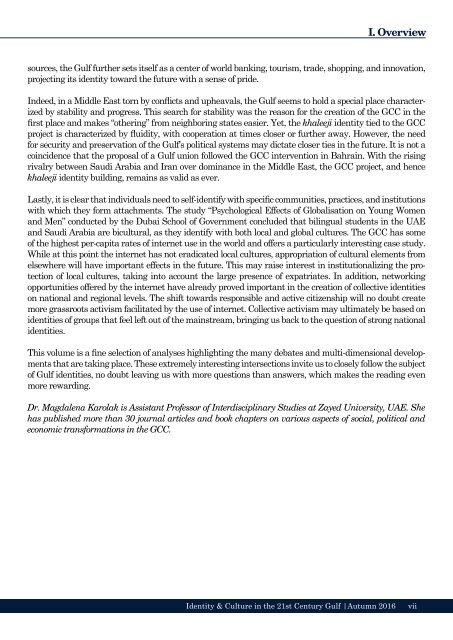You also want an ePaper? Increase the reach of your titles
YUMPU automatically turns print PDFs into web optimized ePapers that Google loves.
I. Overview<br />
sources, the Gulf further sets itself as a center of world banking, tourism, trade, shopping, and innovation,<br />
projecting its identity toward the future with a sense of pride.<br />
Indeed, in a Middle East torn by conflicts and upheavals, the Gulf seems to hold a special place characterized<br />
by stability and progress. This search for stability was the reason for the creation of the GCC in the<br />
first place and makes “othering” from neighboring states easier. Yet, the khaleeji identity tied to the GCC<br />
project is characterized by fluidity, with cooperation at times closer or further away. However, the need<br />
for security and preservation of the Gulf’s political systems may dictate closer ties in the future. It is not a<br />
coincidence that the proposal of a Gulf union followed the GCC intervention in Bahrain. With the rising<br />
rivalry between Saudi Arabia and Iran over dominance in the Middle East, the GCC project, and hence<br />
khaleeji identity building, remains as valid as ever.<br />
Lastly, it is clear that individuals need to self-identify with specific communities, practices, and institutions<br />
with which they form attachments. The study “Psychological Effects of Globalisation on Young Women<br />
and Men” conducted by the Dubai School of Government concluded that bilingual students in the UAE<br />
and Saudi Arabia are bicultural, as they identify with both local and global cultures. The GCC has some<br />
of the highest per-capita rates of internet use in the world and offers a particularly interesting case study.<br />
While at this point the internet has not eradicated local cultures, appropriation of cultural elements from<br />
elsewhere will have important effects in the future. This may raise interest in institutionalizing the protection<br />
of local cultures, taking into account the large presence of expatriates. In addition, networking<br />
opportunities offered by the internet have already proved important in the creation of collective identities<br />
on national and regional levels. The shift towards responsible and active citizenship will no doubt create<br />
more grassroots activism facilitated by the use of internet. Collective activism may ultimately be based on<br />
identities of groups that feel left out of the mainstream, bringing us back to the question of strong national<br />
identities.<br />
This volume is a fine selection of analyses highlighting the many debates and multi-dimensional developments<br />
that are taking place. These extremely interesting intersections invite us to closely follow the subject<br />
of Gulf identities, no doubt leaving us with more questions than answers, which makes the reading even<br />
more rewarding.<br />
Dr. Magdalena Karolak is Assistant Professor of Interdisciplinary Studies at Zayed University, UAE. She<br />
has published more than 30 journal articles and book chapters on various aspects of social, political and<br />
economic transformations in the GCC.<br />
<strong>Identity</strong> & <strong>Culture</strong> in the 21st Century Gulf |Autumn 2016<br />
vii


